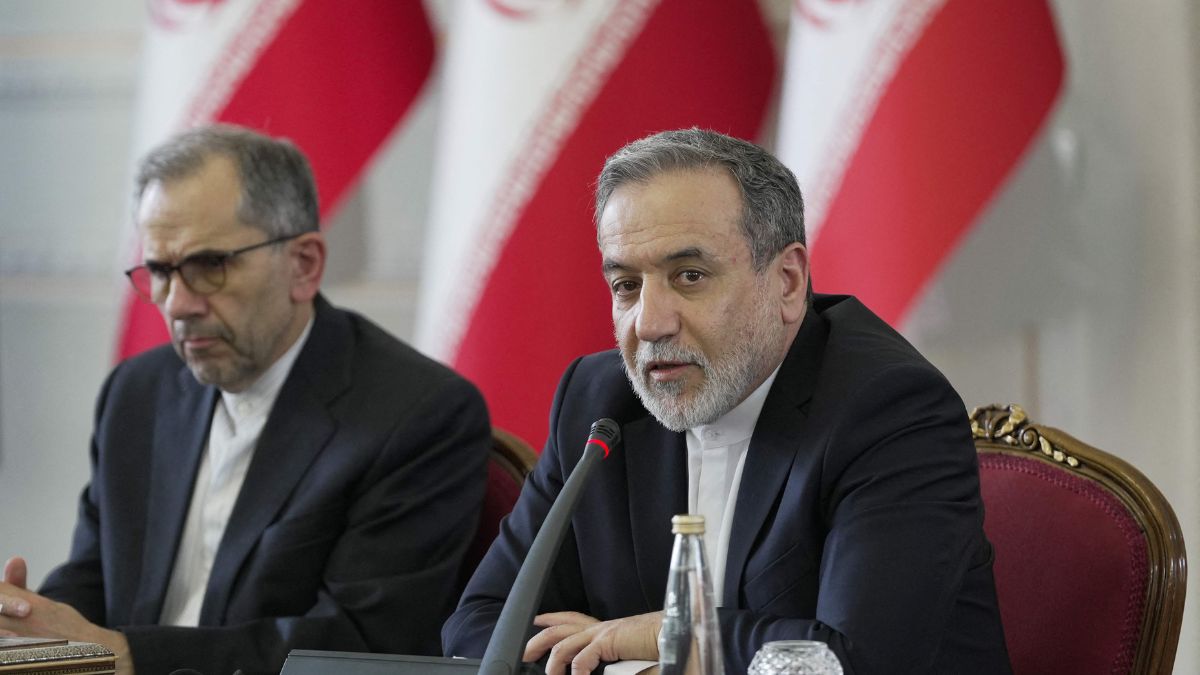Iran agrees on principles for dialogue, negotiating the price now
 FM Abbas Araghchi (R) meeting with ambassadors and diplomatic representatives in Tehran | AFP
FM Abbas Araghchi (R) meeting with ambassadors and diplomatic representatives in Tehran | AFP
Realpolitik. Pragmatism. Making a virtue out of necessity. Regardless of how one looks at it, the Islamic Republic of Iran has given indications of resuming nuclear talks with Washington. The June 13 Israeli military offensive against Iran came on the eve of the sixth round of the Iran-US nuclear talks in Muscat. However, the 12-day confrontation with Israel forced Iran to make a few dramatic announcements.
Led by Supreme Leader Ali Khamenei, Iranian leaders claimed ‘victory’ over Israel and ‘a big slap in the face’ of the US. Social media posts associated with the regime claimed several successes in destroying and downgrading Israeli military capabilities and gloated over the failure of Israeli defence systems against Iranian drones and ballistic missiles. Some even underscored that it was Israel, not the Islamic Republic, which sought a ceasefire and that the latter could have continued its military campaign. The uncertainties over the extent and outcomes of the Israel-US bombings of the nuclear facilities further favoured the Iranian rhetoric.
Iran took some politically catchy moves. On 2 July, President Masoud Pezeshkian signed a law suspending cooperation with the International Atomic Energy Agency. There were even suggestions that Iran might even emulate North Korea and take the extreme step of pulling out of the Nuclear Non-Proliferation Treaty. As happened during the run-up to the 2015 nuclear deal, Iran identified European powers as the weaker link. The Foreign Minister warned that any continuation, let alone intensification, of the UN sanctions would only end the European role in the negotiations. Above all, Iran rejected any possibilities of resuming nuclear talks, especially when ‘zero enrichment’ remains the stated public posture of the Trump Administration.
Though ideological, rhetorical and dogmatic, the clergy in Tehran is not suicidal. Its four-decade survival rests on pragmatic adjustments and U-turns. Having declared a perpetual War with Iraq, for example, Ayatollah Khomeini settled for ‘drinking a cup of poison’ and accepted the ceasefire in July 1988. This time, the ‘poison’ came in the form of stark and uncomfortable Middle Eastern reality.
Once missiles stopped flying, Iran found itself regionally isolated. Yes, all the major players wanted an early end to the Israel-Iran confrontation, and several publicly condemned Israel for violating Iranian sovereignty, unilateralism and military offensive. But none really came to Iran's rescue.
With the sole exception of the Houthis of Yemen, even Iranian proxies—Hamas, Hezbollah or PMF in Iraq—did not join the confrontation. Several Arab powers, especially Jordan, Syria and perhaps Saudi Arabia, actively intervened and shot down Iranian missiles when the latter violated their sovereign airspace. Apparently, Israel even used Syrian airspace to carry out attacks on Iran. Above all, the Israeli officials claim that the Trump Administration has not prevented Israel from resuming its military attacks against Iranian nuclear facilities in the future, should the situation arise.
The human intelligence component of the attacks inside Iran meant the Israeli exploitation of popular discontent against the regime. The Afghan refugees—currently estimated at six million—are the prime targets, and in June alone, more than a quarter of a million refugees were deported back to Afghanistan. Although the process began earlier, the 12-day confrontation appears to have accelerated the Iranian resolve. Other powers were equally coy. Having burnt his fingers over Bashar al-Assad, President Vladimir Putin is extremely cautious; for his part, President Xi has upped the ante against Israel over the Gaza Strip but without rallying around a confrontationist Iran. For their part, Iran and its officials explain the confrontation with Israel as the price for its resolute and unwavering support for the Palestinian cause. Thus, in third countries, only Palestinian officials are openly sharing platforms with Iran.
Into its fourth decade, the clergy is facing a host of domestic issues, including economic, political, social, and religious challenges. While a crisis often makes people rally around the flag, silence on the war front only rekindles popular grievances. And the clergy is acutely aware of this.
This is where one should look at the renewed Iranian desire to resume nuclear talks with the US. In the words of Foreign Minister Abbas Araghchi: “We are examining its timing, its location, its form, its ingredients, the assurances it requires.” The resumption of nuclear talks will not be immediate and would involve a host of pre-negotiation sweeteners and post-deal guarantees. But the process has begun. Or, to paraphrase Bernard Shaw, Iran has agreed on principles and is now negotiating the price.
Professor P. R. Kumaraswamy teaches contemporary Middle East at Jawaharlal Nehru University, New Delhi.
Middle East